Facebook says it will block news link sharing for users and publishers in Australia ahead of new legislation
The social network will use a “combination of technologies to restrict news content” from Australian publishers and will have processes to review removed content.

Facebook has announced that the social network will block sharing of links for Australian users on their site, in light of the country's upcoming regulation legislation aimed at making big tech companies compensate publishers for featuring their content.
In a blog post shared on Wednesday, William Easton, managing director for Australia and New Zealand, said that publishers voluntarily shared content on Facebook's service as it allowed them to “sell more subscriptions, grow audience and increase advertising revenue”. Meanwhile, Google's (which has recently cut deals with local news publishers) main product Search was “inexplicably intertwined” with news and that publishers content was shared without them choosing to, he said.
The world is watching, as the Australian government takes on tech giants Google and Facebook in an effort to make them pay Australian news publishers for their content that is shared on their platforms. If the legislation is successful in Australia, other countries are likely to follow suit, a fact that both companies are likely well aware of.
Also read: Google pens an open letter to Aussies over News Media Bargaining Code
Easton went on to claim that the publishers in Australia had far more to gain from Facebook than the other way around, and that news makes up less than four percent of the content in people's news feeds. He stated that in 2020, publishers gained an estimated 407 million Australian dollars due to around 5.1 billion referrals generated by the social network.
“The proposed law fundamentally misunderstands the relationship between our platform and publishers who use it to share news content. It has left us facing a stark choice: attempt to comply with a law that ignores the realities of this relationship or stop allowing news content on our services in Australia. With a heavy heart, we are choosing the latter,” Easton stated in the blog post.
Here's what happens to news posts being published in Australia, according to the blog post:
Australian Facebook users: They cannot view or share Australian or international news content on Facebook or content from Australian and international news Pages.
International Facebook users: They cannot view or share Australian news content on Facebook or content from Australian news Pages.
Australian publishers: They are restricted from sharing or posting any content on Facebook Pages. Admins will still be able to access other features from their Facebook Page, including Page insights and Creator Studio. Facebook will continue to provide access to all other standard Facebook services, including data tools and CrowdTangle.
International publishers: They can continue to publish news content on Facebook, but links and posts can't be viewed or shared by Australian audiences.
According to Easton, the company was prepared to launch Facebook News in Australia and “significantly increase investments” with local publishers - but only with the “right rules” in place. “This legislation sets a precedent where the government decides who enters into these news content agreements, and ultimately, how much the party that already receives value from the free service gets paid. We will now prioritise investments to other countries, as part of our plans to invest in new licensing news programs and experiences,” he said.
Read more: Biden eyes ex-Obama staff to tackle Big Tech and other antitrust issues
Facebook will use a “combination of technologies to restrict news content” from Australian publishers and has stated that it will have processes to review any content that was inadvertently removed, suggesting the system will be automated with a system for takedown appeals.
Catch all the Latest Tech News, Mobile News, Laptop News, Gaming news, Wearables News , How To News, also keep up with us on Whatsapp channel,Twitter, Facebook, Google News, and Instagram. For our latest videos, subscribe to our YouTube channel.































